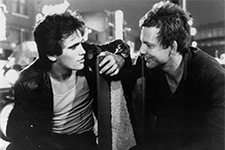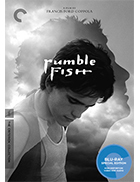Rumble Fish
|  In the span of a little over a year, Francis Ford Coppola, still reeling from the colossal failure of his stylized musical One From the Heart (1982) and the subsequent demise of Zoetrope Studios and his hopes of becoming a full-fledged Hollywood mogul, directed two relatively low-budget adaptations of young-adult novels by S.E. Hinton that, despite being both set in Tulsa, Oklahoma, and having overlapping cast and crew, couldn’t have been any different. The first (and much more popular) was The Outsiders, which chronicled the tensions between “greaser” and “soc” gangs in the late 1960s via the highly stylized ’Scope, Technicolor look of ’50s dramas like Rebel Without a Cause (1954). The second (and much less popular) was Rumble Fish, which was shot in a distinctly black-and-white European art-film style replete with extreme angles, intense visual juxtapositions, and an expressionistic suspension of reality in favor of emotional and symbolic directness. If The Outsiders, which is often pejoratively labeled the more commercial of the two projects, is a film that Nicholas Ray might have made, then Rumble Fish fits right in the wheelhouse of Jean Cocteau or F.W Murnau. Matt Dillon, who also played a delinquent character in The Outsiders, stars as Rusty James, a 17-year-old hood who wiles away most of his time at the local pool hall and with his girlfriend Patty (Diane Lane, also a veteran of The Outsiders). Rusty James is tough, but not particularly bright, and he fancies himself the leader of a teen gang that includes Smokey (Nicolas Cage), B.J. (Chris Penn), and Steve (Vincent Spano), the latter of whom is a reluctant member who Rusty James keeps around because they were childhood friends. However, Rusty James, despite being a good fighter and a brash presence, is no leader, and he lives largely in the shadow of his older brother, who is known only as The Motorcycle Boy (Mickey Rourke). The Motorcycle Boy disappeared some time ago with no expectation that he would ever return, and Rusty James has been trying (and largely failing) to live up to his legend.And then one day The Motorcycle Boy reappears, having traveled to California and back, which sets Rusty James into a kind of slow-spiral identity crisis in which he struggles to make sense of his place in the world and in relation to The Motorcycle Boy, who is, in his eyes and in the eyes of many others, a mythical figure. The Motorcycle Boy, however, wants no part of the gang violence he once lorded over, and he quietly struggles to shed the expectations with which others saddle him. Soft-spoken and deeply internal, he confounds the typical notion of the gang leader, a conundrum that Rusty James simply can’t reconcile. They are not helped by their largely absent alcoholic father (Dennis Hopper, a veteran of Coppola’s Apocalypse Now), who offers little guidance in navigating the treacherous path between childhood and adulthood, the former being defined primarily by petty rivalries and rebellion and the latter by simply running away.Rumble Fish was one of S.E. Hinton’s more challenging novels, so it’s not surprising that it produced the least conventional film adaptation (the other two, in addition to The Outsiders, being Tim Hunter’s Tex from 1982, also starring Dillon, and Christopher Cain’s The Was Then ... And This Is Now from 1985 starring Emilio Estevez and Craig Sheffer). The novel is more philosophical than narrative, and Coppola, who wrote the screenplay with Hinton, follows it closely in that regard, emphasizing its existential themes with extreme visual counterparts involving clocks, out-of-body experiences, and hallucinatory effects that give the impression that everything is unfolding in some kind of bizarre dream. The cinematography by Stephen H. Burum, who also shot The Outsiders and would go on to be frequent collaborator of Brian De Palma’s (they shot eight films together, starting with 1984’s Body Double and ending with 2000’s Mission to Mars), draws heavily from German expressionism—both its morbid psychological themes and its sacrificing of visual realism for emotional and thematic intensity. Although shot entirely on location around Tulsa, Burum’s cinematography creates a consistently otherworldly vibe via deep focus, canted angles, unexpected perspectives, and patently unrealistic touches like constantly billowing smoke with no source and strong contrasts of light and dark (like the silent-era expressionist directors, Coppola had shadows literally painted on the walls to produce effects that would be all but impossible to achieve with actual light). The only presence of color in the film are the titular “rumble fish,” Siamese fighting fish that The Motorcycle Boy likes to watch in the local pet store and who become symbolic stand-ins for the characters who are constantly poised to inflict violence because they don’t know anything else. Coppola also employed Police drummer Stewart Copeland to compose a wide-ranging, frequently bizarre percussive score that more often than not works in counterpoint to the action on-screen.The result is a film that is as intriguing and compelling as it is frustrating. As an aesthetic tour de force, Rumble Fish is a daring and brave work, especially given the precarious position in which Coppola, who had won five Oscars and two Palm d’Ors in the 1970s and produced one of the decade’s biggest box office hits, found himself in the 1980s, as the Hollywood he had once sought to revolutionize was retreating into a safer commercial space. Writing about the film during its brief and ill-fated theatrical release, Time critic Richard Corliss described it as “Coppola’s professional suicide note to the movie industry, a warning against employing him to find the golden gross. No doubt, this is his most baroque and self-indulgent film. It may also be his bravest.” Coppola envisioned Rumble Fish as an “art film for teenagers,” but he underestimated the appetite in Reagan-era adolescents for arty flourish and existential dread; while Coppola’s generation had voraciously consumed the difficult films of Bergman and Antonioni and Dreyer, kids in the ’80s were more attuned to Star Wars (1977) and Porky’s (1982). Not surprisingly, then, Rumble Fish failed to connect with its intended audience, nor did it wow critics, most of whom were baffled by what they saw as Coppola’s self-absorbed obsession with arty obscurity. Time has since revealed the film to be much more than was originally recognized, even if parts of it don’t quite work either narratively or thematically. Both Dillon and Rourke give impressive performances, especially in the way their fraternal characters, who are so very different, struggle and fail to find common ground. Like The Outsiders, Rumble Fish is an adolescent tragedy that ends in senseless violence, and even if it lacks the former film’s more direct and universal appeal to our basic emotions, it will nevertheless click with anyone who can appreciate familiar material told from a different angle.
Copyright © 2017 James Kendrick Thoughts? E-mail James Kendrick All images copyright © ????? | |||||||||||||||||||||||||||||||
Overall Rating: 

 (3)
(3)


